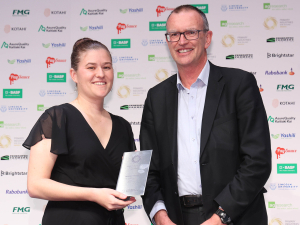Editorial: Having a rural voice
OPINION: The past few weeks have been tough on farms across the North Island: floods and storms have caused damage and disruption to families and businesses.
 PINZ Emerging Leader Award winner Dr Louise Hennessy of AgResearch, with Professor Grant Edwards, Vice-Chancellor at award sponsor Lincoln University. Photo Credit: Neil Mackenzie
PINZ Emerging Leader Award winner Dr Louise Hennessy of AgResearch, with Professor Grant Edwards, Vice-Chancellor at award sponsor Lincoln University. Photo Credit: Neil Mackenzie
Teams and individuals whose talents and work to help New Zealand farmers, foresters and fishers thrive and what they produce were honoured at the 2023 Primary Industries New Zealand Awards last night.
The awards evening, part of the fifth annual Primary Industries New Zealand (PINZ) Summit, saw nine winners announced at Tākina, Wellington’s new Convention and Exhibition Centre.
A mark of the fact that science and research so often underpin solutions to gnarly environmental, climate and production challenges is that AgResearch personnel took out three of the coveted trophies.
The Science & Research Award went to the AgResearch Endophyte Discovery Team for their development and commercialisation of strains of ryegrass with improved insect protection and plant persistence, coupled with fewer adverse effects on animal health.
Scientist Dr Louise Hennessy claimed the Emerging Leader Award for her efforts at AgResearch and other crown research institutes championing support for early career researchers and a learning approach that blends matauranga Māori with western science.
Another AgResearch scientist, Dr Dave Leathwick, was presented with the Primary Industries Champion Award.
Leathwick was praised by the awards judging panel for his knowledge sharing and effective communication. They said Leathwick demonstrated “an unwavering commitment to the rural sector”, in particular championing parasite control and anthelmintic drug resistance management.
On the environmental front, DairyNZ’s Tararua Plantain Project and Adam Thompson of Restore Native Ltd were heralded. The plantain project started in 2018 and with the help of 80 Tararua dairy farmers, dairy companies, government and research partners, DairyNZ has been able to show that with 30% of plantain in pasture sward, nitrogen loss reductions of up to 50% are possible. The project won the Team & Collaboration Award.
A love of restoring land saw former mortgage broker Adam Thompson become one of New Zealand’s most passionate advocates for our native trees and biodiversity. His Cambridge nursery grows more than a million native trees to plant on farms and he leads by example, being well on his way to meeting his personal target of digging in 250,000 trees on his own beef finishing farm. He was presented with the Kaitiakitanga/Guardianship & Conservation Award.
The Fibre Producer Award went to Kaituna-based sawmill OneFortyOne for what judges said was a “relentless drive” for improvement and adding value and, in large part by using their own fibre to power their kilms, dropping the sawmill’s greenhouse gas emissions by nearly half in the last decade.
To cap the evening, the Outstanding Contribution Award was presented. Hot contenders were outgoing DairyNZ Chief Executive Dr Tim Mackle and veteran Country Calendar producer and director Julian O’Brien but the winner was Professor Keith Woodford.
The Honorary Professor of Agri-Food Systems at Lincoln University was recognised for his "long and meritorious" contribution to New Zealand’s primary industries spanning five decades.
An agriculture economist, Prof Woodford has taught generations of New Zealanders, run immersion courses for upcoming sector leaders, and contributed to or supervised many research activities.
Judges said his continued research and writing on current topics - A2 milk, composting barns, mycoplasma, greenhouse gases and forestry in farming systems, to name a few - "has explained these complicated areas to many".
Could a breakthrough in fermentation create a new multi-million-dollar export market for shiitake mushroom extracts into China?
Meadow Fresh has created the world's first fantasy sports league powered by real cows.
This year, 'Foodie February' sees potatoes take the spotlight as one of New Zealand's most powerful and versatile food heroes.
A multi-cultural team is helping to establish one of New Zealand's largest plantings of premium eating grapes - while learning each other's languages and cultures along the way.
The World Wide Sires National All Day Breeds Best Youth Camp Best All Rounder plaudit has become family affair, with 2026 Paramount Cup winner Holly Williams following in her sister Zara's footsteps.
DairyNZ is giving New Zealand farmers a unique opportunity to gain hands-on governance and leadership experience within the dairy sector.